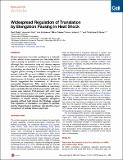Widespread Regulation of Translation by Elongation Pausing in Heat Shock
Author(s)
Shalgi, Reut; Hurt, Jessica A.; Krykbaeva, Irina; Taipale, Mikko; Lindquist, Susan; Burge, Christopher B; ... Show more Show less
DownloadBurge_Widespread regulation.pdf (1.414Mb)
PUBLISHER_POLICY
Publisher Policy
Article is made available in accordance with the publisher's policy and may be subject to US copyright law. Please refer to the publisher's site for terms of use.
Terms of use
Metadata
Show full item recordAbstract
Global repression of protein synthesis is a hallmark of the cellular stress response and has been attributed primarily to inhibition of translation initiation, although this mechanism may not always explain the full extent of repression. Here, using ribosome footprinting, we show that 2 hr of severe heat stress triggers global pausing of translation elongation at around codon 65 on most mRNAs in both mouse and human cells. The genome-wide nature of the phenomenon, its location, and features of protein N termini suggested the involvement of ribosome-associated chaperones. After severe heat shock, Hsp70’s interactions with the translational machinery were markedly altered and its association with ribosomes was reduced. Pretreatment with mild heat stress or overexpression of Hsp70 protected cells from heat shock-induced elongation pausing, while inhibition of Hsp70 activity triggered elongation pausing without heat stress. Our findings suggest that regulation of translation elongation in general, and by chaperones in particular, represents a major component of cellular stress responses.
Date issued
2013-02Department
Massachusetts Institute of Technology. Department of Biological Engineering; Massachusetts Institute of Technology. Department of Biology; Whitehead Institute for Biomedical ResearchJournal
Molecular Cell
Publisher
Elsevier B.V.
Citation
Shalgi, Reut, Jessica A. Hurt, Irina Krykbaeva, Mikko Taipale, Susan Lindquist, and Christopher B. Burge. “Widespread Regulation of Translation by Elongation Pausing in Heat Shock.” Molecular Cell 49, no. 3 (February 2013): 439–452. © 2013 Elsevier Inc.
Version: Final published version
ISSN
10972765